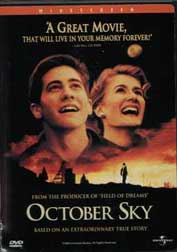January 22, 2007 October Sky
Here's another one of those films that slipped by me when it came out. I am glad it surfaced recently! Here is a review page at rottentomatoes.com...
| This story has elements of creation, fall, and redemption all through it. I see this as the most pregnant aspect of the film. From a redemptive-historical perspective, several allusions attain. The most obvious indicator of the fall was the culture that developed around the mine, which reminded me of the old song, Sixteen Tons- |  |
You load sixteen tons, and what
do you get?
Another day older and deeper in debt.
Saint Peter, don't you call me, 'cause I can't go;
I owe my soul to the company store...
I see allusions of owing one’s
soul to the company which was the great sovereign benefactor. The father,
for all his good qualities, lost sight of other considerations in the
overarching conventional reasoning that placed duty and loyalty to the
company over the considerations of others needs. The crisis of his wife’s
threat to leave him enabled him to move temporarily to a position of
post conventional level five thinking which enabled him to become a
peacemaker in the process, end the strike, and redeem himself in helping
his son. His motivations were likely not pure even in this event, another
evidence of the fall.
I note that the enablers Homer related to were not the status quo movers
and shakers, but rather the little men who made all the difference as
agents of redemption in the world they found themselves in. We see in
the teacher, Miss Riley, a woman beset by a killing disease, a vessel
of hope, encouragement, faith, and diligence in the face of impending
death. Homer’s mother evidences her creation based on nurturing
and defensiveness of her child, even to the point of confronting the
father in righteous indignation and love. Love propelled him in this
move.
We see in the immigrant welder. Mr Bykovsky, self-sacrificing devotion
to his family in need and the deliberation to reject bitterness and
see it as a gift that would enable him to help his family more, which
eventually led to his death. In the statement made by Homer’s abused
friend Roy Lee that he always knew he would be a miner required a move
from concrete operational thought to formal thinking. The Coalwood Way
was overcome in the social relationships the boys developed.
In the black veteran machinist, Leon Bolden, we see the deliberate risk
taken to benefit someone who he identified with. He had been exposed
to a larger world as a WW II aviator and had come back to the limitations
of a culture that was no friend to dreamers. His past experiences were
leveraged to benefit others redemptively. In the friendship that developed
between Homer and Quentin the geek, Homer threw off social expectations
in pursuing a relationship with the class outcast.
Personality and Developmental Theory in October Sky
As with all of human life, there
are developmental aspects of every character in the film. I will focus
on a few of them. From a theoretical stance, formal operational thought,
Piagetian disequilibrium and adaptation was evidenced throughout the
hypothetico-deductive reasoning process of scientific inquiry in the
film. This is seen in the problem solving processes that led to developing
the fins, nozzle, alcohol binder for the fuel, and the evolution of
the firing mechanisms for the rockets. Post formal thinking was required
for solving the problem of finding the stray rocket when it did not
turn up after applying trigonometric calculations.
In regard to personal agency, we see the development of all the rocket
boys, but particularly Homer. His response to the wonder and awe of
discovering something bigger than his world afforded in Sputnick resulted
in his decision to pursue rocketry in spite of a lackluster academic
foundation. Later he would sacrificially choose to give up the pursuit
of his dream- to place it on the altar, so to speak, in order to provide
the resources for his father’s recovery.
Then in spite of his father’s emotional manipulation requiring
his return to the mine in return for approval, he was able to stand
firm and take up the pursuit of his dream again. Finally, he was able
to choose to regard his father as his hero instead of von Braun, who
represented success in many ways. He was able to differentiate in valuing
his father’s hidden attributes of loyalty, steadfastness, responsibility,
heroic self sacrifice in spite of personal rejection and bias. Homer
recognized the qualities he shared with his father and chose to maximize
them, which made him a true leader. As mature personal agents, we must
be willing as the child to be the father to the man, taking our parents
further than they ever had affordances to travel in their own development.
Homer’s devlopment as a mature personal agent is best evidenced
in this quote:
“Dad, I may not be the best, but I come to believe that I got it
in me to be somebody in this world. And it's not because I'm so different
from you either, it's because I'm the same. I mean, I can be just as
hard-headed, and just as tough. I only hope I can be as good a man as
you. Sure, Warner Von Braun is a great scientist… but he isn't
my hero.”
This week's freebie mp3...